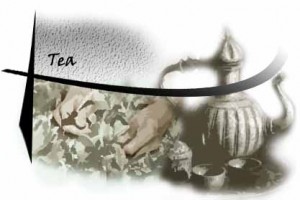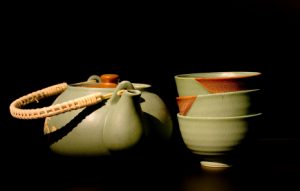An excerpt from “Milk Tea With Pearls” by Emmeline Chang
When I ran off to Taipei, I had no idea what was going to happen. From the way the way my parents talked, you’d think all people did in Taiwan was study and make money and take care of their families. But I wasn’t listening to them. I’d already been a family disappointment for years—practically every cousin in the U.S. was a doctor, but I couldn’t get into a decent med school—and in the last few months I’d become a disgrace. I went into finance; I figured if I couldn’t be a doctor, at least I could carry on my grandfather’s legacy by making huge wads of money.
 The problem was, I was also a suppressed wanna-be playwright and a frustrated closet case—until I got drunk at my perfect cousin Wen Hsiung’s wedding and confessed to three cousins that I was gay. When my parents found out—you should have heard the scenes! It was too much for me: I had to flee the country. Of course, being the bright bulb I am, I didn’t take the easy way out and go to Mexico or Prague: I bought myself a ticket to the old country.
The problem was, I was also a suppressed wanna-be playwright and a frustrated closet case—until I got drunk at my perfect cousin Wen Hsiung’s wedding and confessed to three cousins that I was gay. When my parents found out—you should have heard the scenes! It was too much for me: I had to flee the country. Of course, being the bright bulb I am, I didn’t take the easy way out and go to Mexico or Prague: I bought myself a ticket to the old country.
So there I was, fresh off the plane like all those over-eager, over-achieving Taiwanese Americans taking a pit stop between college and grad school. Only I was thirty-one, and I didn’t have any plans for after the pit stop.
After a few weeks I knew it was a disaster: The house I had rented was right off a noisy street, and its bathrooms were designed so there was always two inches of water on the floor. Scooters and brand new BMWs ran me down every time I went into the street; and the buildings were dingy concrete blocks that made me fantasize about becoming an architect. I couldn’t find out where the gay people were because I couldn’t speak Chinese.
Yes, there I was: El Stupido. I wanted to avoid my family and deal with being gay, so I came to… Taiwan. Land of the Out Homosexuals and Hands-off Relatives. The day I got a cell phone, it started ringing.
“Kah-nath, we invite you to dinner.” “Kah-nath, you want to work in Uncle Fu’s business? Nice opportunity—we make you vice president. Or maybe you want to work in my business? I put you in charge of Taichung City.” “Kah-nath, we introduce you to nice lady from good family.” “Kah-nath, your parents worry about you. You call them.”
I guess with all the money floating around, someone could afford to pay off a telecommunications company. So I had to pretend my name was Asian Queen and get a new cell phone, with cash. (No, the people at the phone company don’t speak enough English to figure it out.)
It was miserable. I was eating the same cuisine every night, taking taxis to streets that were romanized three different ways, and paying for two cell phones and a maid to mop up the bathroom every day. In Chinese class, I was learning how to say “Good morning, teacher. Is Ming Tsai a good student?” This was going to get me a hot boyfriend in about ten years.
I went to the bank and withdrew money from my New York bank accounts. The balances were getting lower. If the situation kept up I’d become like the proletarian expats and have to get a job teaching English. Dictating phrases to a bunch of pimpled bushiban kids wasn’t an exciting thought, so whenever it came up, I shoved it into the part of my mind where my sexual orientation used to go and went on-line. I spent hours every day surfing the web. One day I had the brilliant idea of looking for gay Taiwanese web sites, but they were in… yup, Chinese. On one of them I found a phone number, but when I called, it rang and rang. Several times a day, between choosing which neighborhood Chinese restaurant would serve me my next meal, staring at my Chinese flash cards or clicking onto web sites which listed meetings for “Leather Men in the Seattle Area” or “Gay and Lesbian Francophones” (New York) or “LGBT Asian Pacific Americans” (San Francisco), I dialed the Taiwanese phone number on my Asian Queen cell phone. No answer. All the gay people in Taiwan were out partying—or they had moved off the island, maybe to San Francisco.
I was starting to consider that move myself when fate rescued me. It was a typical day in mid-July. Taipei was like a steam room, and the air was filled with the sound of motorcycle engines and honking horns. I was sprawled out on the soft leather couch in my living room, drinking a glass of Pokari Sweat and blasting the air conditioner to block out the heat and the noise. I was flipping through the cable channels and drifting in and out of a daydream life where I wrote plays and zipped across the Golden Gate Bridge on a motorcycle with my cute, super-confident boyfriend, when a high-pitched, fluting sound interrupted the premier of my first play. I looked around. The sound came again, and then I realized: my doorbell. How pathetic. I’d never heard it before.
A tall, thin guy with a crew cut and wire-rimmed glasses was there. He started talking, proving that I hadn’t learned anything in Chinese class. Zip. Nada. Zilch. I stared at him really hard, and after a moment I saw the facts start to register in his mind: Uncomprehending expression. Faded blue jeans. An English-language program on the TV. A Taiwanese American. He switched to English.
“I am here… to ask for… help. I am from a foundation whose purpose is to counsel and educate the people who have AIDS. We also like to inform the people about the prevention of AIDS.” Every word was precise, like someone who’d studied English very hard in school. I stared at him. Leather jacket. Concerned about AIDS.
“I’m gay. I don’t know where to go. Can you help me?” I just blurted the words. He stared at me. Yeah, I thought, I’m totally desperate. I’m crazy. Then I thought, I wasn’t exactly using vocabulary they teach in school. I looked at his leather jacket. “I’m ho-mo-sex-ual,” I said. I pronounced the word like I was talking to a deaf person.
 His eyes widened like he’d figured out an equation, and then he said, “New World. It is a tea house for homosexuals. It’s location is on Hsin Sheng South Road, in the Lane 54. Very near to the Taiwan National University.” I wanted to kiss him. Instead, I gave him a hundred dollars. Then I thought maybe I should get his phone number, but I didn’t want to look like some tacky guy trying to buy him, so I gave him another fifty and almost shoved him out the door.
His eyes widened like he’d figured out an equation, and then he said, “New World. It is a tea house for homosexuals. It’s location is on Hsin Sheng South Road, in the Lane 54. Very near to the Taiwan National University.” I wanted to kiss him. Instead, I gave him a hundred dollars. Then I thought maybe I should get his phone number, but I didn’t want to look like some tacky guy trying to buy him, so I gave him another fifty and almost shoved him out the door.
That guy probably saved my life. In about a week, I went from being a lonely, depressed guy with no friends to a man who was part of a circle. Back when I took English lit classes, I used to read about people who were part of these artsy, intellectual circles. Virginia Woolf and those Bloomsbury people, or Mary McCarthy and Lionel Trilling and their whole New York intellectual-Commie-lit crit circle. And suddenly there was me—nervous, skinny Kenneth from Short Hills, New Jersey—hanging out with these artists and activists and gay people. They were in galleries and on talk shows and all over the place. I could pick up a glossy gay magazine two of them had started, or join one of their street rallies, or just drink gao liang and sing karaoke and ride around on motorcycles with people who were behind all the vibrant shit going on in Taipei.
It was amazing—the owner had a crush on me, so all I had to do was walk in, and the next thing I knew he was taking care of me. He was showing me a new tea drink every time I came in and taking me to bars and film screenings and high stakes mah jong games. I didn’t have to do anything but smile. He was sexy in a long-haired, wiry, artistic way, so I was pretty happy. After my one disaster of a boyfriend, I was ready to try again. I just thought it was funny, me joining the long tradition of decorative pretty-boys when I had way more money than my provider.
(My Chinese got better too. At first Yan was translating all the time; but after a while I started picking things up. I guess you could say I had some incentive: I was in the center of some happening intellectual group—who wouldn’t memorize a little vocabulary?)
After a while of hanging out with Yan, I figured out that he had some sugar daddy-like figure of his own: Mr. Liu. I’d been hearing mentions of this guy since I arrived. Mr. Liu was calling Yan on his cell phone. Mr. Liu had important clients coming in from Japan or Singapore or Hong Kong, and Yan had to meet them. Mr. Liu was trading in tiger’s teeth again. Mr. Liu was opening a new casino in Macao. I heard that on some evenings, Mr. Liu took over the tea house so he could drink and sing karaoke with his private group of gay businessmen.
I first saw him at the end of my second month at New World. By that time Yan and I were flirting and making out in theaters, and I was wondering if I should go to bed with him. But first I wanted to find out what kind of competition I had. I already knew he was married—that’s competition for sure, but I could write the marriage off to Taiwan, fear, being in the closet, all of that. As if I didn’t know enough about those things. Another man with money, though… who knew?
 It was the middle of the week when I found out Mr. Liu was coming. I came into the teahouse and saw Mei Li sitting with her hands clenched in front of her. All the muscles in her shoulders and arms were tensed—that girl needed a stiff drink, or maybe a real husband. Yan was staring at an order ticket and smacking a spoon around inside a metal teapot. After a moment I realized that he was making a drink. I felt like I was on the set of the wrong movie. Usually Mei Li was the do-everything kind. You could say she kept the tea flowing. Yan was the party boy: he laughed and told jokes and teased people who hadn’t come to the tea house in a while. He juggled guavas and clementines and argued politics and did impressions of the straight customers who looked around, confused, on days when the teahouse looked especially queer. Mei Li bossed the waiters around and made drinks and made loud, upset phone calls when the supplies were late. Without her the whole place would have closed down and followed Yan to some gay party under a Taipei bridge.
It was the middle of the week when I found out Mr. Liu was coming. I came into the teahouse and saw Mei Li sitting with her hands clenched in front of her. All the muscles in her shoulders and arms were tensed—that girl needed a stiff drink, or maybe a real husband. Yan was staring at an order ticket and smacking a spoon around inside a metal teapot. After a moment I realized that he was making a drink. I felt like I was on the set of the wrong movie. Usually Mei Li was the do-everything kind. You could say she kept the tea flowing. Yan was the party boy: he laughed and told jokes and teased people who hadn’t come to the tea house in a while. He juggled guavas and clementines and argued politics and did impressions of the straight customers who looked around, confused, on days when the teahouse looked especially queer. Mei Li bossed the waiters around and made drinks and made loud, upset phone calls when the supplies were late. Without her the whole place would have closed down and followed Yan to some gay party under a Taipei bridge.
“Mei Li,” I said. “What’s up?” I was probably risking my health to say it, but we Americans are supposed to be so forthright and everything.
She jerked her head at waiter Yan. “Business,” she spit out in Chinese. “How are we supposed to stay open? Mr. Liu thinks he can make us close any time so he can have a private party?”
Yan started to say something I couldn’t understand, but she cut him off.
“Friday night! How many customers do you think we’ll lose if we close tonight!”
Yan looked at me and then back at Mei Li. “Just wait a little longer,” he said in English.
“At this rate, in four years we own more than fifty percent, and then I can say something to him.” Mei Li glared at him and then at me.
“Why the fuck are you speaking English?” she said—in English. “Is this a performance for your boyfriend or a talk with your wife?”
“Hey, hey,” I said. “You guys talk. Maybe I should get going.”
Mei Li ignored me. “I am sick of this. You have to get your priority straight. You are married man.” I noticed she was still speaking English.
Yan gave me a nervous smile. He had such sensitive lips, and he was worried about what I thought. Mei Li noticed the smile, and it didn’t help her mood.
“I work from early morning to late at night,” she snapped, “but you throw it away because you can’t stand up to your boss. When will you stop playing?” Tiny short hairs damp with sweat were curling around her face. She was flushed. I wondered suddenly if Yan made love to her. He must have done it at least once or twice. I wondered if he gasped when he went in and what feelings washed through him when he came. For a moment I felt their bodies coming together, sweaty with need. I felt a flash of jealousy, and hurt. They lived in the same house and spoke the same language; they saw each other when they hadn’t showered; they shared all the same friends and all the details of running a teahouse. They’d been married for six years, and I didn’t even know if they slept in the same bed. Sure, there was a crack in the marital foundation; and sure, it was easy to list everything I could give him and she couldn’t, but still.
“Mei Li, stop worrying,” Yan said. “I am not going to be under his control forever. And what is wrong with a little playing?” I looked at the slighted anger on Mei Li’s face. He couldn’t have made love to her for a long time, I thought; and yes, it was insensitive of me, but I was glad.
“Why are you always so upset?” Yan said. “We are paying ahead of schedule.”
Mei Li tensed. “You say ‘Don’t worry, at this rate we will be finished paying fast,’ and then you say ‘Hey, life is not all work. Why don’t we slow down?’ So inconsistent. So irresponsible.” She turned to glare at me. I didn’t say anything, though I could have said, Whoa, girl. This is not about me. But who was I kidding? Of course it was. She was in love with him, and he was gay, and I was the gay guy who was breaking up her fantasy of a happily-ever-after life.
“Uh, really,” I said. “I think I’ll leave you two alone. I have a few things to do before tonight.” And I made my hasty, if cowardly, retreat.
*
 When I came back that night, I could barely recognize the place. Up at the front, next to the bar, the usual tables were gone; and you could see the sectioned-off dance floor with a microphone, large black speakers, and a wide-screen TV—the whole karaoke set-up. The Japanese paper screens—the ones which usually screened off the sides of the room so lovey-dovey couples could sit—were behind the karaoke stage. In front of this all, a bunch of Taiwanese men were crowded around a big table, playing cards loudly and doing shots. I was deciding which one was Mr. Liu when Li Ling passed me.
When I came back that night, I could barely recognize the place. Up at the front, next to the bar, the usual tables were gone; and you could see the sectioned-off dance floor with a microphone, large black speakers, and a wide-screen TV—the whole karaoke set-up. The Japanese paper screens—the ones which usually screened off the sides of the room so lovey-dovey couples could sit—were behind the karaoke stage. In front of this all, a bunch of Taiwanese men were crowded around a big table, playing cards loudly and doing shots. I was deciding which one was Mr. Liu when Li Ling passed me.
“Li Ling.” I pulled her over, then stopped. “Hey—what’s up with the outfit?” Li Ling was in a pink silk qi pao embroidered with blue and red phoenixes. She was actually made up, with blushed cheeks and red lips and the kohl effect around the eyes.
“Don’t say anything,” she said to me. “Tonight I am following the cultural construction of an Asian hostess.” She smiled and I saw a glimpse of the usual warm girl under her outfit. “Mr. Liu’s idea.”
“So which one is Mr. Liu?”
She pulled me closer and pointed. “The one with the most expensive suit, of course.”
I took a look. He was in his forties, with angular features, very dark well-cut hair, and an expensive Italian suit. Not what I’d expected. When I think “Taiwanese businessman,” I think of my uncles—solid dark suits, solid haircuts and solid square frame glasses. Solid waistlines, solid wallets, and a solid lack of style. This guy was stylish and shady and powerful. He was there with a group of fashionable, gay-looking groupies and uncomfortable middle-aged men who all looked at him like he was in charge. And he had paid for Yan’s tea house. Bad news. I was calculating how to win Yan away when someone tapped me on the arm.
“What are you looking at? Should you be looking at me?”
I swung around and grabbed Yan by the shoulders and kissed him.
“Shhh.” He laughed. “It’s better to be—quiet. Mr. Liu knows I am not interested, but it’s best not to make it too obvious.”
At the table, Mr. Liu slapped down a card and called, “Okay, it’s over! I won.” The voices rose. One of the men slapped the table and said, “Okay, Liu. Sing!” The men began chanting: Chang ge! Chang ge! Mr. Liu rose and made his way to the karaoke stage. The wide screen came on behind him. There was a fair-skinned woman walking across the screen, her black hair blowing in the wind. Yan blew gently in my ear. The first chords of a pop love song came on, and a line of white characters appeared at the bottom of the screen.
Mr. Liu wasn’t watching Yan as he sang. He was looking at one of the younger Taiwanese men at the table. I thought the guy was looking at Mr. Liu with kind of mean eyes.
“Those two went to bed together,” Yan whispered in my ear. “Mr. Liu still loves Peter, but Peter looks down on him.”
The chorus started, and the men at the table burst out singing. Zai xin zhong, wo zui ai de ren shi ni…Deep in my heart, the one I love most is you…Not Peter, though. Peter was hard-hearted. When Mr. Liu looked at him longingly, he turned away and did a shot of gao liang. The cheesy chorus line swelled again. Zai xin zhong, wo zui ai de ren shi ni…Yan squeezed my hand. I squeezed his. I was starting to feel bad. Here I was, loved and safe while poor Mr. Liu bought tea houses and sang love songs for guys who didn’t even like him.
But as the evening wore on, I could see it wasn’t just Mr. Liu I should feel bad for. Really, it was all these guys. They gambled and drank and sang heterosexual love songs with tears running down their faces. It was ten o’clock, and then eleven, and then midnight; and they didn’t let up. Their faces got redder, and the air got smokier, and empty cans of Taiwan beer and gao liang kept filling up the table. From an economic point of view, I couldn’t see why Mei Li looked so pissed every time she took more bottles away—these guys were probably giving a houseful of regular customers a run for their money.
 Maybe the singing was getting on her nerves. For hours they sang. They had a whole stack of video discs filled with these love songs. I’m not the one to talk to about healthy gay self-esteem, but if you ask me, I’d say that crying and singing heterosexual love songs for hours on end is probably not the best idea.
Maybe the singing was getting on her nerves. For hours they sang. They had a whole stack of video discs filled with these love songs. I’m not the one to talk to about healthy gay self-esteem, but if you ask me, I’d say that crying and singing heterosexual love songs for hours on end is probably not the best idea.
At first Yan and I sat with them, playing hands and knocking back some shots, but after a couple hours Yan looked at me and said, “We should help Mei Li and Li Ling.” We got up and moved to a little table to the side of the bar—in the general vicinity of where Mei Li and Li Ling were stacking used glasses and dirty dishes. I think he could tell how much their singing was getting to me.
I remember in middle school one day I walked back from school in the rain. After a while the rain started to feel really cold, but I couldn’t do anything. My head was wet and cold; rain was running down my glasses and dripping off my nose; my shoes were sopping wet and my feet were freezing. Every time a car passed, I saw the person inside, warm and dry, moving fast, while I was plodding past gray brush and soggy fences. At first I felt jealous, and then I felt frustrated and angry. All I could see was warm cars and houses and people who had what I couldn’t have. I felt totally helpless; it was like a mass of heavy air covered everything I saw.
Then all of a sudden there was a break in the fences, and I saw a little girl playing in front of a huge house. She didn’t see me staring. She was tiny, with tangled brown hair and mud-splashed legs. She was crouched there in a white dress that dragged in the wet grass, humming and patting the mud together to make a little house. She didn’t even notice the huge, ugly house behind her—its solid brick body and gabled front and enormous chimneys. I took a breath, and then I noticed that the heavy air had lifted. I could feel it like a mass above me, waiting to land, but I could also feel the air around me, light and clear.
That’s how I felt in the tea house. The men were drunk and crying; and I felt the despair moving into my gut and sinking into my bones. Then I looked away from Mr. Liu’s men—across the little table I shared with Yan—and saw him smiling at me: our little table, a safe island in the misery. And I felt it: Yan’s teahouse was an island in Taiwan, and Yan, Yan was an island too.
Copyright 2001 by Emmeline Chang






